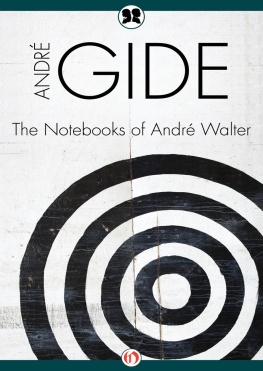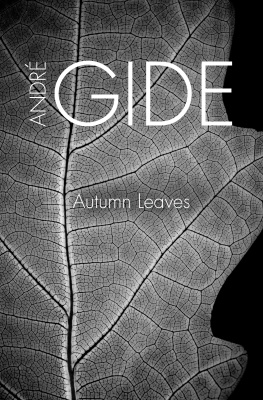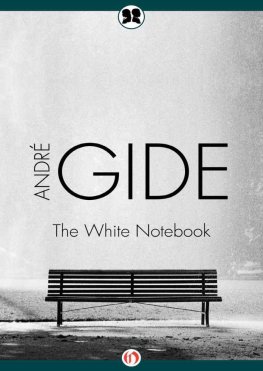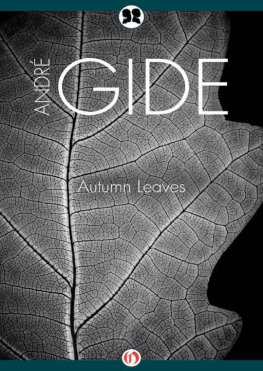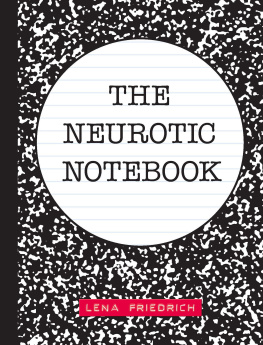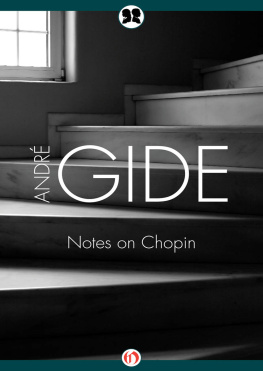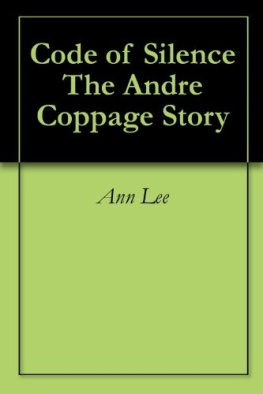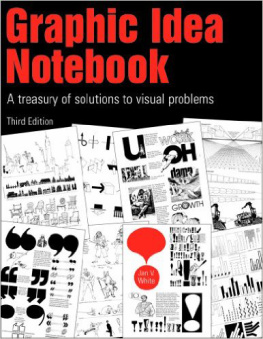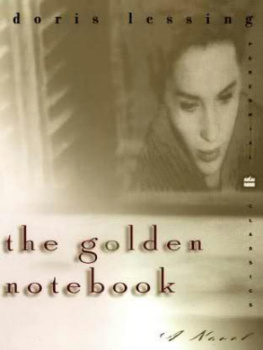Gide André - The Notebooks of André Walter
Here you can read online Gide André - The Notebooks of André Walter full text of the book (entire story) in english for free. Download pdf and epub, get meaning, cover and reviews about this ebook. City: London, year: 1968, publisher: Philosophical Library;Open Road;P. Owen, genre: Detective and thriller. Description of the work, (preface) as well as reviews are available. Best literature library LitArk.com created for fans of good reading and offers a wide selection of genres:
Romance novel
Science fiction
Adventure
Detective
Science
History
Home and family
Prose
Art
Politics
Computer
Non-fiction
Religion
Business
Children
Humor
Choose a favorite category and find really read worthwhile books. Enjoy immersion in the world of imagination, feel the emotions of the characters or learn something new for yourself, make an fascinating discovery.
- Book:The Notebooks of André Walter
- Author:
- Publisher:Philosophical Library;Open Road;P. Owen
- Genre:
- Year:1968
- City:London
- Rating:5 / 5
- Favourites:Add to favourites
- Your mark:
- 100
- 1
- 2
- 3
- 4
- 5
The Notebooks of André Walter: summary, description and annotation
We offer to read an annotation, description, summary or preface (depends on what the author of the book "The Notebooks of André Walter" wrote himself). If you haven't found the necessary information about the book — write in the comments, we will try to find it.
The Notebooks of André Walter — read online for free the complete book (whole text) full work
Below is the text of the book, divided by pages. System saving the place of the last page read, allows you to conveniently read the book "The Notebooks of André Walter" online for free, without having to search again every time where you left off. Put a bookmark, and you can go to the page where you finished reading at any time.
Font size:
Interval:
Bookmark:

The Notebooks of Andr Walter
Andr Gide
Translated from French and with an Introductionand Notes by Wade Baskin
Philosophical Library


By courtesy of Radio Times Hulton Picture Library
INTRODUCTION
Publication of The Notebooks of Andr Walter early in 1891 marked the formal entrance of Andr Gide (1869-1951) into the literary world of Paris. He had thought that his message would bring him lasting fame. With funds provided by his mother, he had planned to publish two editions of the Notebooks: a limited de luxe edition for his friends and a large plain edition for the public. The plain edition, containing the sub-title uvre posthume but not the authors name, appeared first. Gides confidence was severely shaken when, instead of creating the sensation he had envisioned, the work was unenthusiastically received. He salvaged a few copies, keeping some for himself and selling the rest for scrap. Still, this first rebuff was not catastrophic, for the Notebooks set a pattern which persisted through the years and formed the substructure of the masterworks of his maturity: the search for catharsis and liberation through literary creation. Years after their abortive publication, in If It Die (1926) Gide wrote: It was not only my first work, it was my summation.
His first sustained prose work is more than a painful analysis of the inner conflicts of a sensitive adolescent. It is a prefiguration of the direction of Gides subsequent development as a man and as an artist. Each of his works may be viewed as a milestone in his quest for authenticity, an experiment in self-analysis through the medium of art. He once complained that La Bruyre painted men as they were, but without telling us how they became what they were. In the Notebooks Gide tries to overcome this deficiency by projecting on the printed page the inner conflicts of Andr Walter, his ill-starred double. Here, in the first of a long series of semi-autobiographical studies in the tradition of Montaigne and Pascal, Gide tries to harmonize the warring elements in his own nature.
He has suggested that the conflicting elements in his nature are traceable to the duality of his background and to early childhood experiences. While he probably exaggerated the importance of heredity in trying to explain the conflicts which motivated the development of his major themes, he was the product of two culturesCatholic Normandy and Huguenot Uzs in the south of France. His father, Paul Gide, was born in the small town of Uzs, near Nmes, in Languedoc. Paul Gide married Juliette Rondeaux in 1863 and lived with her in Paris, where he was professor of Roman Law, until his death in 1880. Juliette Rondeaux came from a family that had lived in Rouen for five generations. Originally of peasant Catholic stock, the family had prospered and Juliettes grandparents had embraced Protestantism. According to Gide, it was his mother who awakened his moral conscience and his father who revealed to him the world of art. His childhood was strongly influenced by his mothers piety, her strong sense of duty, and her condemnation of sensual indulgence, all of which led Henri Peyre to speak of her loving tyranny.
The crucial incident of Gides youth is the one analysed in the Notebooks: the awakening of his love for Madeleine Rondeaux. He had suffered since early childhood from nervous tension, excessive timidity and feelings of inferiority. He began to practise self-abuse at an early age and was expelled from school, at the age of eight, when this habit was discovered. Loneliness, unnamed fears and nightmares caused him intense suffering during his sombre childhood. Then Madeleine, his cousin, entered his life. Two years older than he, she nevertheless represented innocence, purity and moral perfection. She appears as Emmanule (God with us) in the Notebooks and under various names in his other works. With characteristic candour Gide recorded in his memoirs the events leading to the communion of thoughts and ideas experienced by these two suffering, frightened children. She was fourteen and he was twelve when one day he entered her room unexpectedly, to find her on her knees. He kissed her, whereupon he noticed that her cheeks were wet with tears. She confided that she had learned of her mothers secret love affair, and he felt that the shock of her discoverywhich she was forced to withhold from all others, including her father whom she idolizedwould mark her for life. Awareness of her need for him gave him a purpose, an ideal. The desire to comfort and protect Madeleine elevated him and inspired in him a mystical love, which coincided with the awakening of his literary vocation.
Gide belongs to a generation of writers who were not afraid to experiment with traditional art forms. Each of his writings stresses his freedom as an artist. Given certain materials, he tries to weave them into an artistic expression of some profound human experience. The tortured history of his adolescence, his temptations and anguish, his guilt and, hopefully, his eventual triumph over demoniac forces through his love for Madeleine are the raw elements of the Notebooks. The work was to be more than a unique revelation of the universality of suffering and despair; it was to be a noble, moving declaration of his unsullied love for Madeleine and a manifesto written for an expectant audience. He had determined at the age of sixteen to complete the great manifesto, in which he intended to lay bare the inmost secrets of the human heart, before his twentieth year. First, however, he had to complete his studies and prepare himself for his task.
He began to keep a journal, hoping to use this material in his great work. He felt that the crisis in his own life would provide a framework for his book, and the first emotional upheaval in his life seems also to have been the most significant from the aesthetic viewpoint. His love for Madeleine was so pure and mystical that he was never able to associate it with ordinary physical love. His intimacy with his cousin made everything in his life take on new meaning. They spent many hours together, sharing their thoughts and reading the works of poets and thinkersVerlaine, Baudelaire, Goethe, the Greek poets. Their preferred language was the language of religious aspiration. Typical is the passage transcribed from his journal and attributed to Andr Walter in the Notebooks: We are alone in your room, overcome by tenderness and passion. In the caress of the air something ineffable causes tears to flow and the soul to escape from the body and to coalesce in an embrace.
It is not unusual for a first love to evoke feelings of mystical or religious exaltation that seem to banish sensual desires, but in the normal course of events these conflicting elements are harmonized. In Gides case a sense of guilt was aroused by his failure to live according to the strict moral code prescribed by his mother and later by Madeleine, by his obsession with carnality in the form of onanism. Sex and sin were intimately fused in his thoughts. The weight of the flesh, which checked his aspiration towards Madeleine and God, could be transcended only by his primary vision.
One summer he decided to travel through Brittany alone (even though his mother insisted on meeting him at fixed points) and to keep a diary during his tour. His first writings were an experiment in rhythm. Titled Reflections from ElsewhereMinor Studies in Rhythm, they were published in the literary review
Font size:
Interval:
Bookmark:
Similar books «The Notebooks of André Walter»
Look at similar books to The Notebooks of André Walter. We have selected literature similar in name and meaning in the hope of providing readers with more options to find new, interesting, not yet read works.
Discussion, reviews of the book The Notebooks of André Walter and just readers' own opinions. Leave your comments, write what you think about the work, its meaning or the main characters. Specify what exactly you liked and what you didn't like, and why you think so.

